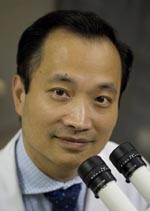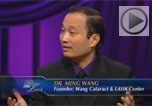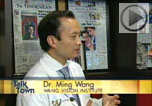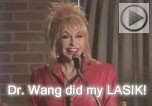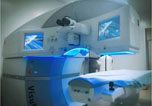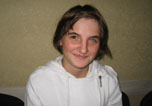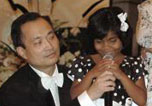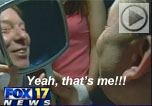- Over 55,000 LASIK and cataract procedures (including on over 4,000 doctors)
- The FIRST center in TN to offer Laser Cataract Surgery
- Introduced bladeless all-laser LASIK to the state
- Implanted the state's first FOREVER YOUNG™ Lens
- The first surgeons in the US to perform a new Intacs surgery to treat keratoconus
- Helped patients from 40 states and 55 countries
- International referral center for cataract surgery and LASIK complications
- Read Dr. Wang's book: LASIK Vision Correction
Why did you decide to have LASIK? Why did you choose Dr. Wang? How has your life changed since your LASIK procedure?
What is your advice for people considering LASIK?
Click to read more
| Article Library | Print This Page |
THE 5-MILE STONE BRIDGE
Ming Wang, M.D., Ph.D.
1801 West End Ave, Ste 1150, Nashville, TN, 37203
615-321-8881, drwang@wangvisioninstitute.com; drmingwang.com
The last time I was in mainland China was 20 years ago. Recently, I went home again with my parents during the Chinese New Year.
I visited my grandparents in Anhai located in the southeast part of Fujian Province. On my way to China, my heart was filled with anticipation and excitement. I thought about the nice quiet little town Anhai, her small streets filled with people selling clay puppet heads. I remembered the serene 5-mile stone bridge cross a beautiful stretch of bay, linking Anhai to the continent. I recalled with nostalgia of those leisurely strolls that I took as a child at the dusk from my grandparents’ home to the edge of the town. I remembered how I climbed on a small hill where a tall stone monument stood, overlooking vast plain of farmland amidst evening breeze and pastoral peace.
So much had changed since I was there 20 years ago. When we arrived in a small motor-powered tricycle at my grandmother’s house, I stood in front of the house in total disbelief. Where was I? Where had the grand old front door gone? I could not find the small clay street, the beautiful array of little red-roofed houses. In front of me now was a new and strange world: a broad concrete boulevard with bustling advertisements. It was not until I heard my name called and I turned around to see my grandmother and aunts coming towards us, that I finally recognized the front door of grandmother’s house. It was still there. But it looked so small now, so insignificant, as if it were trying to hide away from the bustling new world.
One of the things that wanted to do on this trip was to visit a local hospital. When I left China 20 years ago, I was 22 years old. I did not know any medicine and not really remember what it was like in a Chinese hospital. Having graduated from a US medical school, I was curious about Chinese hospitals. My aunt, who was an internist in the local Zhong Yi Yuan”Hospital for Chinese medicine, took us there one day. The hospital was housed in a 50-year old three-story building. On the walls were pinned many pictures, mostly paintings advocating “planned parenthood”. One painting showed a happy family with a smiling and overweight baby. Presumably that was a happy family since they had one, needed only one child, a good child. I followed my aunt to her outpatient clinic. It was a room of about 10x10 ft. There was one desk and two rolls of chairs lined against the walls. About eight patients were in the room. My aunt sat at one end of desk, and two patients came forwards and sat right besides her. She felt their pulses, examined their tongues, and wrote Chinese herb prescriptions. There was no privacy. Their conversation could be heard clearly by all others in the room. Though the room was crowded and the facility simple, I must admit that the patients and the doctor seemed to get along quite well. The patients listened attentively, and were grateful to the doctor for the medical help. I couldn’t help feeling a bit of envy for the confidence that these patients had in their doctor, as I recalled my own experience in US hospitals. Though we have much better hospitals and equipment, patients often walk in and say to me, “Doc, I came for a second opinion, because I am not sure if my doctor was doing the right thing when he ask me to have a cataract operation.”
The part of the hospital that particularly fascinated me was the pharmacy, where because of my aunt’s connection, I was allowed to visit. It was a huge room. Floor to ceiling cabinets lined all four walls. In those cabinets stood large jars, pots and boxes filled with herb medicine. I felt a bit awed standing in the center of these as if I was surrounded by thousands of years of Chinese medical history.
Adjacent to the pharmacy was the building window inside of which sat two female billing operators. I chatted with them and found out that the majority of the patients pay for their own health care. The government workers get their bills sent to the government and the hospital gets reimbursed later. There was no insurance company involved, no codes. I was amazed when I realized that the entire hospital billing was squarely taken care of by these two women. I thought about my US hospital –an entire floor taken up by the billing offices and the exceedingly large amount of paper work, and physical and psychological stress endured by physicians and patients. I wondered what were the secrets of this simple and effective Chinese way of doing things and what would the Clintons think about all this.
China is undergoing a tremendous amount of change. The president of the hospital told me that the hospital was owned and paid for by the government up until last year when the hospital became financially independent. They now have to not only continue offering the best care that they can, but also seek creative ways of doing business. Because of the traditional way of social interaction and the incomplete legal system as judged by Western standards, there still are a lot of payments made under the table. To have a prominent surgeon perform an operation, one has to pass many “Hong Bao”(red bags containing cash). I don’t think that I would feel comfortable practicing medicine in China right now. In US, my practice will at least have some backing of malpractice insurance. But if I operate in China today, I am all alone. Having received so many Hong Baos and under so much personal and family pressure, I would be too nervous to perform any operation.
Business is everywhere in China today. The whole Anhai town was vibrating with raw entrepreneurial energy. Throughout my stay, I searched in vain for any remnants of the old charming town. The serene hill where the stone monument stood was gone. In its place stood a mini theme park complete with bumper car rides. I could hardly find any more local traditional art pieces such as the clay puppet heads. Instead, the stores were filled with Mickey Mouse and stereo players.
The night before I left Anhai, I went to the 5-mile stone bridge with my parents. I was so happy to find that the bridge was still there. There I was again, just as a child, standing at the head of the bridge looking over the bay and the Anhai town at dusk. I said to myself, “You know, China has changed, perhaps in some ways too much. But just as this enduring stone bridge, she will always be there, in her grand old form.”
五里桥
三十年前,我离开了中国大陆。在阔别家园三十年之后,我陪伴父母再度踏上归乡之旅,去过一次农历新年。
我们去探望住在福建省东南部安海的祖母。在返回故乡的旅途中,一路上我的心被期待和雀跃涨得满满的。我回忆起小时候回安海老家的一切:那是个静谧的小城,它的街道里布满了贩卖瓷土烧绘的傀儡戏偶头部的商家。 有一座五里桥,全是大石碓起来的,她沉静地横越一弯美丽的流水,连系着安海至陆岸。每次回老家和接送我们的亲戚们,一起走过宁静的五里桥, 桥的两岸海风吹拂, 现在还记忆犹新。。。。 想着想着,一幅画面在我脑海里徐徐展开:一个小男孩,从祖父母家出来漫步玩耍至安海小城边际。。。。在薄暮中爬上矗立着一座巨大石碑的小山丘,俯瞰着脚下莽莽苍苍的农地原野,徜徉在徐徐的晚风和苍穹无尽的田园氛围中。。。。。
但现在那一切似乎都不复存在了。当我们乘着机动三轮车抵达祖母家时,我呆立在房子前,全然无法置信眼前看到的一切。我现在究竟身处何方?祖母家的那扇古老宏伟的大门到哪儿去了?我看不到那条熟悉的卖戏偶的小街,那群整齐排列的、拥有美丽红色屋顶的房子也不见了。如今在我眼前展开的是一个全新且奇异的世界:一条宽大的水泥大道填塞着熙攘杂乱的广告招牌,车水龙马。直到我的祖母和姑姑们唤着我的名字并迎上前来,我才终于认出了老家的大门。实际上它还在哪儿,依然伫立在原地,但此刻它看起来却是如此渺小,一点也不显眼,仿佛它试图在这喧嚷的新世界里悄悄地躲起来。
此行另一项目的是参观国内当地医院。三十年前离开中国时,我才22岁,对医药一无所知。现在自美国医学院的医学训练后,我渴望了解中国医院的现状。我的一位姑姑是本地一家中医医院的内科医师,一天她接待了我们去参观她工作的医院。这家医院的主体是一栋已有五十年历史的三层楼建筑,墙上悬挂了许多张照片和画作,大部份的内容都是有关计划生育的。一幅画描绘着一个仅有一个小孩的快乐家庭:孩子欢笑着且被养育得白白胖胖,其意思是一胎化是幸福家庭的基础,生养后代应重质不重量。我跟随姑姑来到她的门诊室,约莫30英吋见方的大小,内部陈列了一张桌子和靠墙的两排椅子。约有八位病患都同时在诊室内。姑姑坐在桌子的一端,两位病患趋前挨着她的右侧坐下。她按了脉,检查舌象,然后写下中药处方。这里病人看医生毫无隐私可言,他们的每一句对话都清楚地飘散在这小小的空间里。虽然这儿是如此拥挤不堪和简陋,我所看到的医病关系却是无比和谐。病患专注地倾听着医生的诊断和告诫,并对医生所给予的治疗欣然感激。我的心灵深处突然感到一丝小小的嫉妒,这里的病人对待医生是如此全然的信任!不禁回想起自己在美国医疗体系里看病人的经验:尽管美国有更好的设备和医院,病人却往往一坐下就嚷道:“喂!医生,我自己的医生建议我做白内障手术,但我不太相信他。今天来的目的只是想听听你有什么不同的说法!”
这家医院的药房特别吸引了我的注意。因为姑姑的关系,我得以进入参观。它的空间相当大,从地板到屋顶的四面墙上全都紧密排列了一格又一格大小不同的药柜,琳琅满目的瓶罐和药材井然有序地排放在柜格中。我站在房间的中央,只觉一阵目眩神迷,一颗心猛烈地跳动着,几乎不能自己。这四面墙,装载着中国五千年来的医药历史,它们在静静地诉说着一路走来历代先人积累了难以计数的文化和心血结晶,在荜路蓝缕里,将炎黄子孙繁衍培育成世界第一大国!
邻近药房连接着两个窗口,里头有两位女性收费员。我从与她们的闲谈中得知:这里大部份的病人须自付医药费。政府先收取费用后,然后再拨款给医院。没有任何保险制度。其中更令我吃惊的是,整个医院的收入现金都直接由这二位收费员经手看管。在美国,光收费部就得占去整个一层楼,繁复大量的纸上程序,迫使医生和病患都得默默忍受大量的人力物力的浪费。我悟出这倒是美国人所缺乏而且应向中国学习的一个哲理–––「化繁为简」。
如今中国正经受着惊人的变化。医院院长告诉我,在去年以前,医院还隶属于政府,等同受雇。但从去年开始,医院已被允许经济独立。现在他们不仅可以在提高医疗服务的质量上自主,也能够寻求更积极的商业方式, 为医院增加收入。但由于医疗模式尚无法完全走出传统,且无类似西方的法令限制,至今仍然有许多台面下的收费。例如,若想指定名医做手术,病患家属必须先行递送装有现金的“红包”。对此我略感到有点儿不自在。在美国,我们医生有医疗保险,以作为手术结果有争议时的后盾。但若易地而处,我在中国当医生,在尚未为病人做手术之前就收取红包,我可能会非常紧张,背负着莫大的压力而无法发挥正常的手术水平。
当今商业和生意在中国无处不在,整个城市因充盈了蓄势爆发的商业能量而隐然骚动着。在这段回老家的时间里,我苦苦访寻往日那个迷人的安海小镇的蛛丝马迹,却废然而止。那个我小时候玩耍过的有石碑的小山丘已无从寻觅,在相同的位置上已摇身一变成为一个商业主题公园,四周停满了车。我再也看不到任何与往日地方艺术有关的痕迹,傀儡戏偶早已被米老鼠和电动玩具取代,思之不禁惘然。
离开安海的前一夜,我和父母重访了五里桥。我惊喜地发现她还在那儿!她像是顽固地伫候多时,只等着与老朋友重逢。哈,再一次,我又化身为当年那个小男孩,在黄昏向晚的暮色中站上五里桥头,痴痴地远眺着流水和傍晚的安海,眼下充满生机的城市和远处金黄色的夕阳。。。。 故友般的石桥,熟悉的海风。。。。我叹了一口气,轻声地自言自语:“真的,的确,中国已经变了;或许有些地方还过头了点。但也许她就像这墩古老的石桥一样,会永远在那儿, 屹立着不倒,以她经历沧桑而永不变根本的雄姿。”
Our new texbooks
A 501c(3) charity that has helped patients from over 40 states in the US and 55 countries, with all sight restoration surgeries performed free-of-charge.


